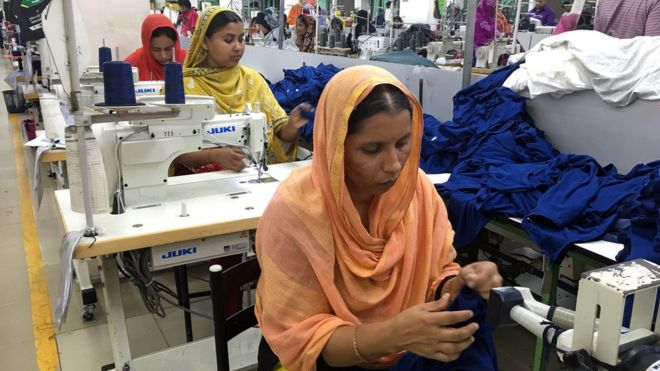Nothing has stopped Shirin Begum from going to work every day at a garment factory for more than 10 years – but last month’s deadly attack by Islamic militants in the capital, Dhaka, could change that.
She walked to work in Dhaka even during Bangladesh’s never-ending general strikes, political violence and labour unrest. But now she fears her livelihood is in danger because of the recent jihadist violence.
“What will happen to us if the buyers are not going to come to Bangladesh?” says Shirin, a mother-of-two who works as a seamstress at a factory just outside Dhaka that stitches clothes for many Western retail brands.
She is one of the four million workers in the industry, which is the world’s second largest exporter of ready-made garments, next only to China.
In July, militants overran a cafe in an upmarket area of Dhaka killing 20 people, most of them foreigners. Two policemen and the six militants also died.
A group of Italians who were involved in buying clothes for Western brands were among the victims. Seven Japanese also died in the siege.
For the first time, foreigners were taken as hostages and killed in Bangladesh. The massacre has sent shivers down the spine of the industry.
Soon after the incident, a number of Western buyers cancelled visits to Bangladesh and many retail brands have started pulling their staff out of the country.
Game changer
The garments industry has transformed this impoverished nation in the last three decades. It has helped millions of people like Shirin to move out of poverty.
That’s why many people describe this industry as the backbone of the economy.
Last year the country exported about $28bn (£21bn) worth of ready-to-wear clothes and the industry has set an ambitious target of $50bn by 2021.
Cheap labour costs have been one of the main reasons Bangladesh has established itself in the global supply chain for low-end textiles and clothing.
Many major global retail brands, such as H&M, Walmart, Gap and Marks & Spencer, buy their clothes from Bangladesh.
Some in Bangladesh describe the recent upsurge in Islamist violence as a game changer in the country’s turbulent history.
No-one knows how far radicalisation has penetrated society. There is a sense of fear and despair. This Muslim-majority nation is on edge following the recent violent incidents.
Tarnished image
“It will definitely affect our industry very gravely,” says Rubana Huq, managing director of Mohammadi Group, which makes clothes for many Western fashion brands.
“This has to stop. I don’t think the industry or the country can afford any more shocks,” she says.
The Bangladeshi garments industry is only just beginning to recover from the Rana Plaza disaster in 2013, which saw a factory building outside Dhaka collapse, killing more than 1,130 people.
Most of those who died were garment factory workers.
The disaster tarnished the image of the industry. Following the incident, Western retailers came under intense pressure to source clothes from factories that implement strict safety regulations.
Though some foreign companies have suspended all but critical travel to Bangladesh, they have not yet cancelled their orders.
The latest violent incidents will not have any short-term impact as Bangladesh is still an attractive destination for clothes retailers because of its low-cost production.
“The medium and long-term impact will be they will try and source their products from somewhere else. That is natural. A buyer would want to stay in a country which is safe,” says Rubana Huq.
Future questions
While China is still the world’s leading garments exporter, countries like Cambodia, Myanmar and Sri Lanka are challenging as alternative garment industry hubs.
And some Western companies are looking at Ethiopia as a potential option, with factories now coming up there.
But the uncertainty over the security situation has forced many Bangladeshi factory owners to reconsider their own plans.
“I was planning to expand my production lines for denim products because of the increasing demand,” says Fakir Kamruzzaman Nahid, managing director of Fakir Fashion.
“But some of my foreign buyers told me that they will not come to Bangladesh for one year because of the security situation. After consulting with them I will decide on my expansion plan.”
The government has promised to boost security for visiting foreigners and says it is confident that it can bring the situation under control.
Foreign buyers like Yusuke Yamaguchi say that despite security concerns, Bangladesh offers plenty of opportunities.
“The risk may be a bit higher here, but many countries face the problem of terrorism,” says Mr Yamaguchi, director of One Piece Limited, a Japanese firm that buys clothes from Bangladesh.
“Bangladesh is still business-friendly and our business has been growing.”
The clothing industry says if foreign firms stop buying from Bangladesh it would have a huge social impact. It wants the government to take immediate steps to boost the confidence of foreign buyers.
For Shirin Begum the potential is clear.
“If they go to some other country to buy clothes, then factories here will be forced to shut down and we will lose our jobs.”
(BBC)










